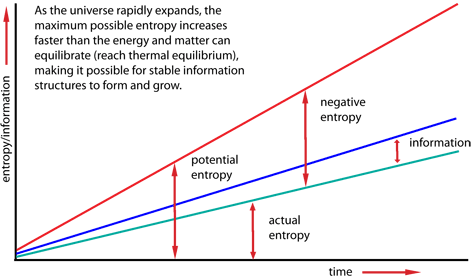Origins of Information in the Universe
The universe began in a state of equilibrium some 13.75 billion years ago.
In thermodynamic equilibrium, there is only motion of the microscopic constituent particles ("the motion we call heat"). The existence of macroscopic structures, such as the stars and planets, and their motions, is a departure from thermodynamic equilibrium. And that departure we call the "negative entropy."
The second law of thermodynamics says that the entropy (or disorder) of a closed physical system increases until it reaches a maximum, the state of thermodynamic equilibrium. It requires that the entropy of the universe is now and has always been increasing.
This established fact of increasing entropy led many scientists and philosophers to assume that the universe we have is "running down" to a "heat death." They think that means the universe began in a very high state of information, since the second law requires that any organization or order is susceptible to decay. The information that remains today, in their view, has always been here. There is nothing new under the sun. They are
determinists.
But the universe is not a
closed system. It is in a dynamic state of expansion that is moving away from thermodynamic equilibrium faster than entropic processes can keep up, as suggested in 1935 by
Arthur Stanley Eddington. He said...
The expansion of the universe creates new possibilities of distribution faster than the atoms can work through them, and there is no longer any likelihood of a particular distribution being repeated.
(New Pathways in Science, 1935, p. 66)
The maximum possible entropy is increasing much faster than the actual increase in entropy. The difference between the maximum possible entropy and the actual entropy is negative entropy or potential information, as shown graphically in the 1970's by my colleague in the Harvard astronomy department
David Layzer.

Creation of information structures means that in parts of the universe the local entropy is actually going down. Creation of a local low entropy system is always accompanied by radiation of entropy away from the local structures to distant parts of the universe, into the night sky for example. The total global entropy always increases, satisfying the second law, even if it never reaches the maximum possible entropy.
As the universe expands (see the figure), both positive and negative entropy
are generated. The normal thermodynamic
entropy, known as the Boltzmann Entropy, is the large black arrow. The negative entropy, often called the Shannon Entropy, is a measure of the information content in the evolving universe.

Entropy and information can thus
increase at the same time in the expanding universe. There are
generally two entropy/information flows. In any process, the positive entropy
increase is always at least equal to, and generally orders of
magnitude larger than, the negative entropy in any created information
structures. Positive entropy must exceed negative, to satisfy the second law of thermodynamics, which says that overall entropy always increases.
Material particles are the first information structures to form
in the universe.. They are quarks, baryons, and atomic nuclei,
which will combine with electrons to form atoms and eventually molecules,
when the temperature is low enough. These material particles are
attracted together by the force of universal gravitation to form the gigantic
information structures of the galaxies, stars, and planets.

Microscopic quantum mechanical particles and huge self-gravitating
systems are both stable and have extremely long lifetimes.
When stars form, they become another source of radiation after the original Big Bang
cosmic source, which has cooled down to 3 degrees Kelvin (3K)
and shines as the cosmic microwave background radiation.

Our solar radiation has a high color temperature (5780K) but a low energy-content temperature (273K). It is out of equilibrium
and it is the source of all the information-generating negative
entropy that drives biological evolution on the Earth.

Note that
the fraction of the Sun's light falling on Earth is less than a billionth of
that which passes by and is lost in space.
A tiny fraction of the solar energy falling on the earth gets converted
into the information structures of plants and animals. Most
of it gets converted to heat and is radiated away as waste energy to
the night sky.

Every biological structure is a quantum mechanical structure.
DNA has maintained its stable information structure (again, thanks to the extraordinary stability of quantum structures) over billions of years in the constant presence of chaos and noise.

The stable information content of a human being survives many
changes in the material content of the body during a person’s lifetime.
Only with death does the mental information (spirit, soul)
dissipate - unless it is saved somewhere.
The total mental information in a living human is orders of
magnitude less than the information content and information
processing rate of the body. But the information structures created
by humans outside the body, in the form of external knowledge
(we call them the
Sum), including the enormous collection of human artifacts,
rival the total biological information content in any individual.
Information increases and we are co-creators of the universe
Creation of information structures means that today there is more information in the universe than at any earlier time. This fact of increasing information fits well with an
undetermined universe that is still creating itself. In this universe, stars are still forming, biological systems are creating new species, and intelligent human beings are co-creators of the world we live in.
All this creation is the result of the one core process that creates all information. It is a combination of two distinct physical processes, one quantum mechanical, the other thermodynamic. Understanding this core creative process is as close as we are likely to come to understanding the invention of an anthropomorphic creator of the universe There is no such agent, but
cosmic creation is a still-present divine providence, the cosmic source of everything
good and
evil.
Normal |
Teacher |
Scholar